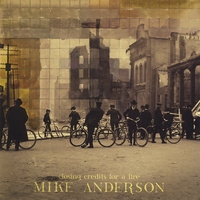Mike Anderson’s newest release, Closing Credits For a Fire, is a nice presentation. The cover artwork is very interesting, and the CD is nicely pressed from a glass mastering process (not some cheap burned CD). The music is similarly polished. Every detail of the recording is clear and clean. The production and engineering qualities are excellent. (I have a few issues with this, however, which I will discuss later.)
The music is mostly folk-based rock; there is also a bit of blues mixed in. Instrumentation is generally acoustic guitar, a single male lead vocal, background vocals, drums, electric bass, electric guitar, piano, keyboards and the occasional percussion instrument. The piano sounds especially excellent, but every instrument is clear and balanced with the others. Together, they either sound like a band who has played together for a long time or a bunch of super polished studio musicians. Mostly the songs are slow to mid-tempo and vocal driven in a typical Nashville song-writing production style. This is the problem.
Typically, Nashville-styled productions seem to have a hook-based song-writing style. Mike Anderson does not seem to quite fit this picture. Some of his songs, like “Hello,” “Bone Dry” and “Won’t Let it Go” have hooks as their basis, but the songs don’t seem to drive towards the hook like you would expect from an album that sounds like this.
The music is produced excellently, but it is just too boring to not have a super focused lyric driving the songs. After listening to the album a bunch, I still never find myself singing any of the lyrics or humming any of the melodies. There is simply nothing that is memorable.
Whoever engineered this album did an excellent job of picking microphones and mixing everything with perfect definition. The problem I have is that they seemed to do exactly what is expected. This adds to the monotony of the album. They should have done something different. However, maybe this is what Mike Anderson wanted. Who knows? Regardless, there needs to be something experimental if the songs are going to be so uneventful (the tom-led verses of song 8, “Right Words,” are somewhat refreshing, as well as the somewhat trippy beginning of “When Jane Comes Calling”). The other thing I might recommend is a new microphone for the lead vocal. Perhaps one that has more bass and feels a little more like something Sinatra might have used could help a bit.
Overall, the album leaves me uninspired. The music and lyrics combined with a (perhaps overly) digitally clear production style don’t make me want to listen to this album in the future. I could see this album having some success among the artist’s friends and certain people who really like this guy for whatever reason, but I see very little large-scale success as the album lacks single-style songs.














